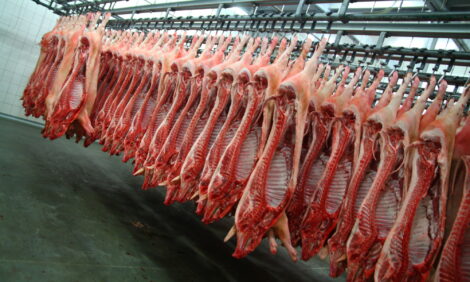



Maple Leaf's Lessons from the Listeriosis Crisis
"Do the right thing," an official from Canada's Maple Leaf Foods advised the audience at the Banff Pork Seminar 2009, describing the best response of a processor to a food contamination crisis.
Vice-President, Government & Industry Relations, Maple Leaf Foods Inc.
There's no magic in responding to tragedy, says Rory McAlpine, Vice-President, Government & Industry Relations, Maple Leaf Foods Inc. In the case of the listeriosis outbreak linked to the deaths of 20 Canadians in 2008, the needed response was as clear as it was simple: do the right thing.
For Mr McAlpine, the anxiety surrounding the outbreak hit home immediately when his own son, a 21-year-old university student fell seriously ill for 48 hours from listeriosis. "There's no question that he got it from a Maple Leaf product. It resonates with you personally when you see that happen," Mr McAlpine told pork producers and industry representatives at the Banff Pork Seminar.
Ultimately, the way people react in recognizing the gravity of a situation personally is no different than how even large corporations should react, he found. Maple Leaf Foods responded as though it were hit in the gut, and reacted with the appropriate urgency, honesty and consumer-first focus that has proven the key to managing the crisis and rebuilding confidence in its brand. This approach has earned the company accolades for doing what's right and putting that principle far ahead of any concern for the bottom line.
Many companies talk the talk, but it is another thing entirely to walk the walk.
"There's nothing magical about this," said Mr McAlpine. "It's very much instinctive. But it really does begin with corporate values and having the right ones in place to begin with."
Walking the Walk
For a company suddenly thrown into managing a crisis, the way you are regarded instantly becomes all about what you do, not just what you say, observed Mr McAlpine during a break-out session on 'Re-Building Consumer Confidence'.
"If there's ever a situation where that comes to the fore, it's in the type of situation we faced with respect to Listeria.
"We as a company subscribe to a set of values that I think are deeply ingrained but you only really find out if they are deeply ingrained if you get yourself in a crisis like this. The two that really came to the fore were 'do what's right' and 'dare to be transparent'," he said
Led by CEO Michael McCann, the company drew on its established culture and values to quickly identify and implement a response based on four key approaches:
- Taking accountability
- Putting public health and consumer interests first
- Leading in an open and fact based manner, and
- Implementing a decisive action plan.
Recognizing what was needed did not depend on in-depth understanding of the issue but that requirement rapidly followed. "You quickly as an executive team have to become familiar with some hard facts about what you're dealing with," said Mr McAlpine. "For example, I would suggest at this point Michael McCann has become one of the best educated individuals on the science of Listeria and the practical measure for avoiding it in the country."
Taking Charge
Media coverage of the outbreak was intense, unrelenting and instantaneous. There was no time to mull over strategy. Under these demands, Mr McAlpine credited the company's established culture with ensuring the fastest approaches would also be the right ones.
"Our CEO was wired to very quickly issue a public apology and make a commitment to fix the problem. He wasn't listening to accountants and lawyers; he clearly knew as an organization, we were going to put consumer interests first."
Maple Leaf had a communications team in place but it was very small. It did have some external help but the critical component of operating effectively was fast, honest reaction. "A key lesson here was not to overthink strategy, to keep our messages and tactics straightforward. You don't second guess, because time doesn't allow you, frankly, to think too much about it. You just have to do it, and do what you know is right."
Another key was to keep fact focused and act quickly to fill the information void. Maple Leaf could not afford the luxury of waiting or relying on government or others to deliver key facts on risk that the public demanded. The company had to take the lead. "We did it through multiple means, and we did it 24/7," explained Mr McAlpine.
This involved several initial press conferences in rapid succession and numerous other external approaches. "We also had to pay attention to our internal communications. In a large organization you face the need to manage communications internally, as much as externally, in this kind of event."
Being Prepared
When it came to implementing a decisive action plan, being prepared beforehand was a critical advantage. "We were fortunate in that we had a well established recall manual and we continually do mock recall exercises. You have to anticipate what will happen and you have to know who's in charge, what roles each individual is going to play, etc. You have to have the teams pre-established and you have to have the discipline and the tools in place to execute. Fortunately I think we did have that. We weren't perfect but were certainly were well prepared."
Maple Leaf appointed a recall team, managed by a top performer in quality and systems management. "We had clear accountabilities that involved obviously the CFO, the CEO, our senior business leaders, and we had a team that involved people in quality assurance/food safety, communications, regulatory aspects and sales, and we maintained a continuously updated report on all the tasks and what was happening in all of our plants. As a result of this we maintained twice daily calls, and we mapped all our activities and tracked all the information continuously 24/7 for several weeks in a row."
March 2009








